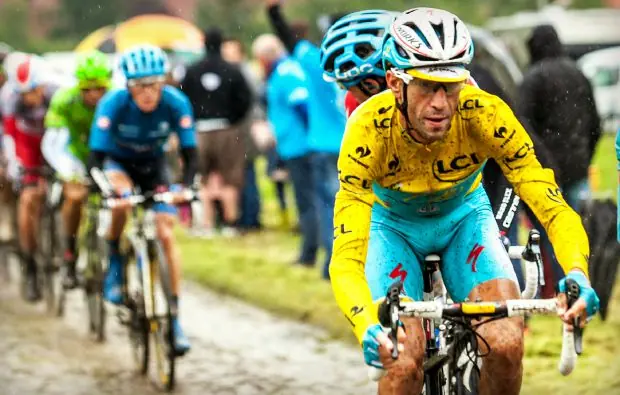
Cycling seems to get more press for a rider's hoodwink actions, or even unfounded calls of cheating, than anything else. Granted, the sport's athletes have only themselves to blame, and blatant acts of swindling by some of cycling's best don't exactly encourage the press to put away their pitchforks.
In case you don't already know, the Vuelta commissaire threw Vincenzo Nibali, winner of the 2014 Tour de France and one of only six riders to win all three Grand Tours, out of the Vuelta a Espana for cheating.
More: How to Become a Year-Round Cycling Fan
Nibali, instead of continuing the two-wheel travel common in bike racing, opted to utilize four-wheel travel to catch up to the peloton after being involved in a crash. Leading the chase group, a car from Team Astana pulled beside Nibali and quickly accelerated to the peloton with Nibali literally in tow.
Both Nibali and Astana team manager Giuseppe Martinelli have made statements alluding to a belief that the team's actions are not unprecedented, and a rider receiving help from the team car occurs all the time.
"It happens in the Tour, I've seen it a thousand times," Martinelli told VeloNews. "Try to find me an honest person in the peloton. Any sports director would have done the same thing to save their leader."
There is some truth to this statement. Referred to as the "sticky bottle," riders often utilize the propulsion of the team car when being handed water bottles. Riders return to team cars to retrieve drinks and, when the handoff occurs, the person in the automobile will hold on to the bottle for a few seconds, effectively towing the rider during that period.
Also, let's not forget that riders often draft off their team car when trying to rejoin the peloton or hold on to the team car when receiving medical attention.
In these instances, there's a moral gray area. Cycling rules often give riders who might be injured or suffered a crash some leniency when trying to make their way back to the peloton. Also, drafting is not the same as towing. When drafting, the cyclist is still moving forward mostly by his or her own energy. In Nibali's case, he received a free ride.
More: Talking Tactics with Professional Cyclist Marianne Vos
But did the punishment fit the crime?
Despite many riders receiving help from team cars, race commissaires rarely hand out sanctions. There are only a few recent examples of commissaires taking action. The 2014 Tour de France saw one rider disqualified after using a team car to tow him back to the peloton. That same year, at Paris-Nice, Gianni Meersman drafted off his team car for what seemed like ages to climb back into the main group. The powers that be docked him time and sprint points.
Meanwhile, Richie Porte received a stiff two-minute time penalty at the Giro d'Italia after his tire went flat, and he accepted a replacement wheel from a rider on another team. Meanwhile, commissaires routinely turn a blind eye to sticky bottles and shifty drafting.
But in Nibali's case, with the whole incident caught on video and social media about to explode in finger-pointing epithets, the commissaire had no choice. Whether the bottle he grabbed had a little too much adhesive, or he legitimately thought he was doing no wrong, Nibali is officially gone from the Vuelta.
Is it just? You be the judge.
More: Relive the Tour de France on Instagram
 Ready to Ride? Search for a cycling event.
Ready to Ride? Search for a cycling event.


